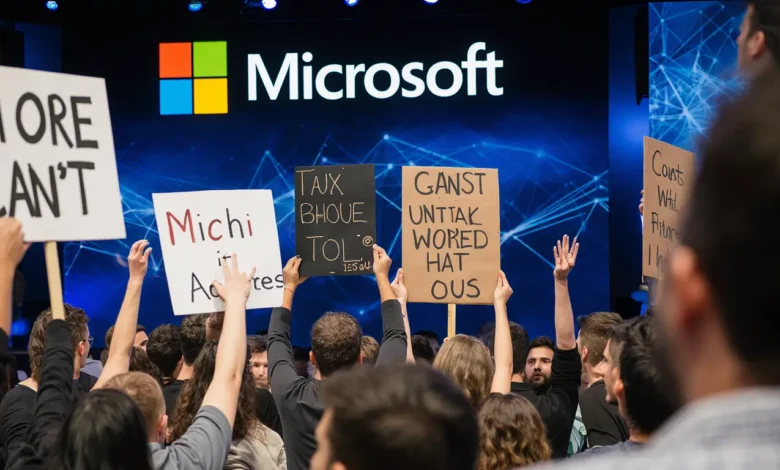Microsoft Azure Employee Resignation Protest: The Moral Reckoning Inside Big Tech

Microsoft Azure employee resignation protest sparks a profound conversation on ethics, technology, and the role of conscience in the world’s largest tech companies. What began as isolated resignations has turned into a global movement of moral reckoning—one that questions not only what Big Tech builds but also who it serves.
table of contents
Microsoft Azure employee resignation protest
Microsoft’s Azure division has long been the backbone of global cloud infrastructure, powering governments, corporations, and AI systems worldwide. But in 2025, a wave of ethical protests shook its pristine image. A senior engineer, after thirteen years with the company, publicly resigned and emailed thousands of employees stating: “I can no longer work for a company that fuels systems of surveillance and violence.”
That statement ignited a chain reaction. Employees, interns, and even external contractors began voicing similar concerns about Azure’s partnerships—especially those involving military and surveillance contracts. Under the campaign name “No Azure for Apartheid,” employees organized peaceful protests across Microsoft’s Redmond campus and other offices worldwide.
In India, where Microsoft employs tens of thousands of engineers, the news spread like wildfire across social platforms such as X (formerly Twitter) and LinkedIn. Indian tech circles began debating whether engineers can—or should—refuse to participate in ethically ambiguous projects.
Tim Cook and Apple’s Next Chapter: AI Expansion, Global Shifts, and the Question of Leadership
The background: When cloud meets conflict
The controversy began when reports emerged that Azure’s cloud infrastructure was indirectly supporting projects linked to the Israeli Ministry of Defense through partner programs. These services allegedly included AI analytics, storage, and edge-computing capabilities used in conflict zones.
Although Microsoft denied any direct involvement in weaponization, activists argued that such denials ring hollow in the age of cloud interdependence. Azure, like AWS and Google Cloud, offers modular services that can easily be integrated into military operations.
What made this protest unprecedented was its internal visibility. Employees were not just protesting outside company gates—they were challenging executives from within, using open letters, Slack channels, and company-wide emails.
Microsoft’s official response
Microsoft quickly issued statements affirming its “commitment to responsible AI and lawful use of its technologies.” Company spokespeople emphasized that Azure customers are bound by ethical usage agreements and that there is no verified evidence of misuse of its services to harm civilians.
Still, the company quietly suspended certain Azure AI features provided to an Israeli military unit, pending review—a move both applauded and criticized. Critics viewed it as a half-measure, while supporters saw it as an important acknowledgment of employee concerns.
However, the tension deepened when several employees were reportedly terminated after participating in sit-ins at Microsoft’s offices. Protesters said they received termination notices or voicemail warnings, further fueling accusations that Microsoft was suppressing internal dissent.
A moral dilemma for modern engineers
What makes the Microsoft Azure protest remarkable isn’t only its corporate magnitude—it’s what it reveals about the moral struggle inside the tech workforce.
For decades, software engineers focused on building fast, scalable systems. Today, they’re being asked to consider the ethical consequences of those systems. The resignation protest represents a generational shift: engineers no longer see themselves as neutral tool-makers but as moral agents responsible for how technology impacts humanity.
A former Microsoft employee in India summarized it bluntly:
“Working on Azure AI used to mean working on innovation. Now it sometimes feels like working on surveillance.”
This internal awakening echoes past movements in Google (“Project Maven”) and Amazon (“No Tech for ICE”), where workers refused to build systems for military or immigration enforcement. Microsoft, however, faces a unique challenge—its Azure cloud underpins critical government and defense infrastructures worldwide.
India’s voice in the storm
India has emerged as an important backdrop to this story. With its massive pool of Azure developers, data-center operators, and AI researchers, the moral debate naturally extends to Indian engineers.
The case of Vaniya Agrawal, an Indian-origin software engineer who interrupted a global Microsoft event to denounce Azure’s role in military surveillance, gained huge traction in Indian media. Her act symbolized a rising sentiment among young engineers—particularly from IITs and global startups—who demand transparency from their employers.
Indian media outlets such as Times of India and Economic Times covered the story from two angles:
- Ethics and accountability in global tech, highlighting how moral choices made by Indian engineers affect global supply chains.
- The geopolitical dimension, exploring how Indian talent fuels both Western innovation and, indirectly, its defense ecosystems.
The debate is no longer confined to Seattle or Silicon Valley. It’s now alive in Bengaluru, Hyderabad, and Pune—India’s major tech corridors—where discussions on “ethical cloud” and “responsible AI” have entered coding meetups and university seminars.
The wider industry impact
The Microsoft Azure employee resignation protest isn’t an isolated incident; it’s part of a growing trend redefining corporate ethics in technology.
- At Google, employee walkouts forced management to halt military AI projects.
- At Amazon, internal protests pushed the company to revisit how its facial-recognition tools were marketed.
- At OpenAI, several researchers resigned over the commercialization of safety research.
For Microsoft, however, the stakes are higher because Azure is tied to multi-billion-dollar government contracts, including with the U.S. Department of Defense and NATO. Ethical resistance within Azure thus challenges not just company policy—but the global architecture of tech-military cooperation.
Industry analysts say the protests could reshape how tech giants negotiate contracts, with future deals possibly requiring independent audits and human-rights compliance clauses.
The risk-management equation
From a corporate-strategy viewpoint, Microsoft faces a complex balancing act:
- Reputation risk: Protests and resignations create perception problems for a company that brands itself as a leader in “responsible AI.”
- Talent retention: Younger engineers increasingly choose employers aligned with their moral values. Losing them could hurt innovation pipelines.
- Government relations: Cutting or modifying contracts can trigger political backlash, especially when national-security narratives are involved.
- Market competition: If Microsoft limits its scope on ethical grounds, competitors like Amazon AWS or Google Cloud may capture those deals, creating an uneven competitive field.
Thus, the issue is not merely ethical—it’s deeply strategic.
The human story behind the headlines
Beyond corporate calculus lies the raw human dimension. The employees who resigned or protested are not radicals—they are engineers, parents, and global citizens who believed in technology’s power to improve lives.
Their protests, letters, and resignations embody a silent cry echoing across the tech industry: “We can’t separate our code from its consequences.”
Many of these workers grew up believing that joining a company like Microsoft was the pinnacle of achievement. Now they find themselves torn between career loyalty and moral responsibility. Their courage to speak out—knowing the professional cost—is what transforms a workplace dispute into a historical moment.
Ethical AI and the new social contract
The controversy forces a deeper question: Should AI and cloud companies be held accountable for how their products are used by clients?
Traditionally, technology providers have hidden behind “user responsibility” clauses. But as AI becomes embedded in defense, policing, and surveillance, that logic collapses. Azure’s protest highlights the urgency for a new social contract between engineers, corporations, and society—one that aligns innovation with conscience.
Possible solutions being discussed include:
- Mandatory ethics boards within cloud companies with real authority to veto contracts.
- Transparent public disclosure of government or military partnerships.
- Global ethical-use certifications for cloud services.
- Stronger whistleblower protection for tech employees.
These steps would not only protect moral integrity but could also enhance trust—an increasingly valuable asset in the AI era.
A message to the global tech community
The Microsoft Azure employee resignation protest symbolizes a generational demand for moral clarity in technology. It’s not a rejection of progress but a plea for conscience.
As one protester said outside Microsoft’s headquarters:
“We love what we build. That’s why we must ask who it serves.”
This shift from blind innovation to mindful creation could define the next decade of tech culture. From Bengaluru to Redmond, from Tel Aviv to London, the same question echoes: Can technology remain neutral when its impact isn’t?
The protests may fade, but the conscience they awakened will not. The engineers of today are not just building clouds—they are shaping the moral weather of the digital age.
FAQ
Q1: What triggered the Microsoft Azure employee resignation protest?
It began after employees discovered Azure cloud services being linked to defense and surveillance projects, leading to ethical objections and resignations.
Q2: What is “No Azure for Apartheid”?
It’s an internal employee campaign demanding Microsoft cut all Azure contracts with the Israeli military and disclose all defense-related cloud partnerships.
Q3: How did Microsoft respond?
Microsoft suspended certain services for review and reaffirmed its commitment to responsible AI, but it also terminated some protesting employees—sparking further backlash.
Q4: How is India connected to this issue?
India is a major engineering hub for Azure, and several Indian-origin employees have taken public stands on the issue, making it a topic of national ethical debate within the tech industry.
Q5: Could this movement influence global tech policies?
Yes. Experts predict stricter transparency rules, human-rights audits, and new ethical-compliance frameworks for cloud contracts in the coming years.
Discover more from Feenanoor
Subscribe to get the latest posts sent to your email.







